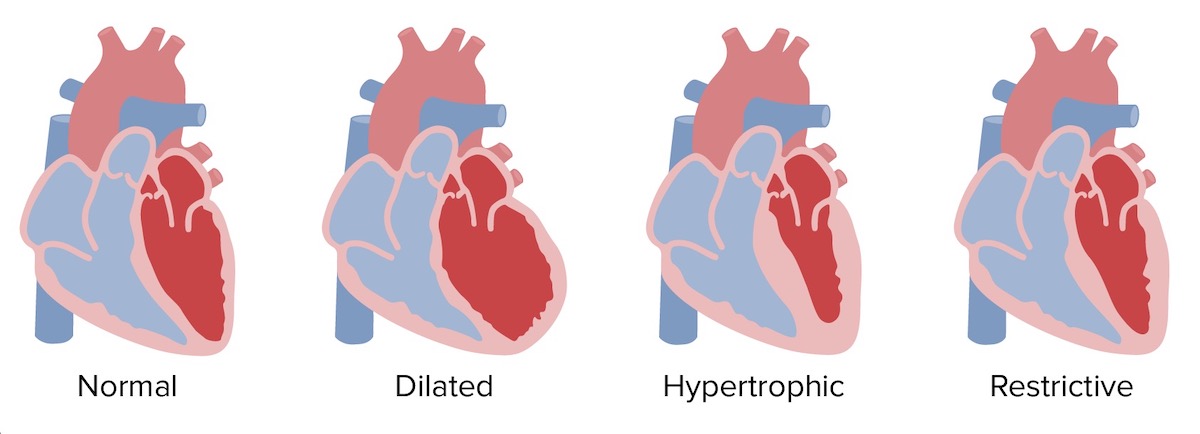Cardiomyopathy, or heart muscle disease, is a progressive condition that affects the heart’s ability to function properly. The heart becomes enlarged, thickened, and/or stiffened, reducing its efficiency in pumping blood and leading to heart failure and the accumulation of blood in the lungs or other parts of the body. It may also cause abnormal heart rhythms. It can occur in people of all ages and races, with approximately 1 in 500 adults affected by the disease. Some types are more common in certain groups, such as dilated cardiomyopathy which is more common in black people, and dilated and arrhythmogenic cardiomyopathy which is more likely to occur in males.

Types of Cardiomyopathy
There are four main types: dilated, hypertrophic, arrhythmogenic, and restrictive. Dilated cardiomyopathy is characterized by an enlarged heart chamber and is the most common form in children. Hypertrophic cardiomyopathy is marked by thickened heart muscle and often presents in childhood or early adulthood. Arrhythmogenic cardiomyopathy is marked by irregular heart rhythms. Restrictive cardiomyopathy is characterized by stiff or scarred heart muscle and is the least common type.
Some cases do not fit into the main categories of the condition. These include broken heart syndrome, also known as stress-induced or takotsubo cardiomyopathy, which is characterized by temporary heart enlargement; chemotherapy-induced cardiomyopathy, which is heart damage resulting from cancer treatment; and peripartum cardiomyopathy, a type of congestive heart failure that occurs during or after pregnancy.
Causes of Cardiomyopathy
The cause of this condition is often unknown, but in some cases, it can be acquired as a result of another condition or inherited from a parent. There are several health conditions and behaviors that can contribute to the development of acquired cardiomyopathy, including:
- Long-term high blood pressure
- Heart damage from a heart attack
- Long-term rapid heart rate
- Heart valve problems
- COVID-19 infection
- Heart inflammation
- Metabolic disorders such as thyroid disease, or diabetes
- Vitamin and/or mineral deficiency
- Pregnancy
- Iron buildup in the heart muscle
- Granulomas growths
- Connective tissue disorders
- Substance abuse
- Chemotherapy
- Radiation therapy
Unfortunately, cardiomyopathy is a progressive heart condition, which means it will get worse over time – especially if the disease isn’t treated. The condition can lead to serious complications, including heart failure, blood clots, heart valve problems, cardiac arrest, and sudden death. Heart failure occurs when the heart is unable to pump enough blood to meet the body’s needs, and if left untreated, it can be life-threatening.
Blood clots may form in the heart due to the heart’s reduced ability to pump effectively, and if these clots enter the bloodstream, they can block the blood flow to other organs, including the heart and brain. It can also cause the heart valves to not close properly, leading to blood flowing backward in the valve. Additionally, irregular heart rhythms can result in fainting or sudden death if the heart’s ability to beat effectively is compromised.

Symptoms of Cardiomyopathy
Often cardiomyopathy goes undiagnosed, as the symptoms can be difficult to recognize – especially in the early stages. There might be no warning signs at all in the first stages of the heart condition. As the heart condition progresses, symptoms will appear. Symptoms you should keep an eye on, include:
- Breathlessness with activity or even at rest
- Swelling of the legs, ankles, and feet
- Bloating of the abdomen due to fluid buildup
- Cough while lying down
- Difficulty lying flat to sleep
- Fatigue
- Heartbeats that feel rapid, pounding, or fluttering
- Chest discomfort, pain, or pressure
- Dizziness, lightheadedness, and fainting
Treatment Options
The main goal of treatment is to slow the progression of the disease, control symptoms, and prevent sudden death. Treatment may involve lifestyle changes such as adjusting diet and physical activity, reducing stress, avoiding alcohol and other drugs, and taking medications. Your doctor may also recommend treatment for any underlying conditions that may have contributed to the development of cardiomyopathy or recommend surgery. The specific treatment plan will depend on the type you have. For inherited or genetic types, it is not possible to prevent the condition, but adopting a healthy lifestyle can help manage symptoms and complications. If you have a disease or condition that could potentially cause this, early treatment of that condition may help prevent development.
A healthy heart is vital for a healthy body. Having a healthy lifestyle, especially when you’re getting older or has a chronic medical condition, is the best way to do this. This means following a healthy and varied diet, quitting smoking, and keeping a close eye on your blood pressure and making sure it is healthy. For more information about a healthy heart, cardiomyopathy, treatment options, and other heart conditions, continue your search here:

